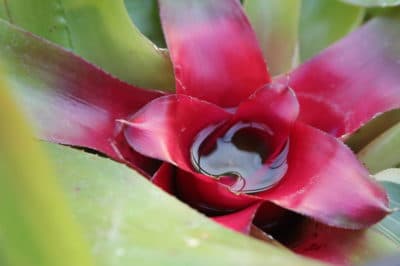Don’t Over-Water a Bromeliad
Over-watering is more likely to cause problems for bromeliads than any other mistake you might make. This can occur because you water too frequently or because the potting medium and/or container don’t drain well. Make sure the potting medium has plenty of bark, perlite and vermiculite and the container has one or more large drain holes. In most cases, you won’t need to water more than once a week.
Bromeliad Tanks
Some kinds of bromeliads don’t really get much moisture from their roots or leaves. Instead they have what’s called a central tank that acts a water reservoir. When you water, always make sure that you’ve filled the tank. You should also dump water out of the tank periodically so it doesn’t get stagnant and lead to rot.
Watering Epiphytic Bromeliads
Air plants like Tillandsia don’t grown in potting medium. In the wild, they attach themselves to trees. It’s actually hard to over-water these plants, simply because they can’t absorb any excess. Mist them several times a week or submerge the entire plant in a bowl of water for a few minutes. Turn it upside down for about 10 minutes afterward to ensure it drains well.
Choosing the Water for Bromeliads
Since bromeliads may absorb water differently from other kinds of plants, the kind of water you use really can make a difference. Here are the best choices:
- Rainwater is the best choice; it doesn’t contain chemicals and is naturally softened.
- Distilled water is another possibility and filtered water is also good.
- Reverse osmosis water has been cleaned of chemicals and other harmful material.
Using Tap Water
For some people, tap water is really the only option. If that’s the case, always let the water sit out on a counter overnight in some kind of wide-mouthed container. This will allow chlorine and fluoride to dissipate. If you use tap water, you should always leach salts several times a year. Water the plant until it is saturated and water runs freely out the bottom.
Humidity for Bromeliads
In addition to regular watering, many bromeliads like higher humidity than is found in most houses, especially in winter with central heating. Any of the non-tank plants benefit from misting a couple of times a week. It’s definitely better to use rainwater or distilled water for misting, because the leaves are covered with very fine hairs that are sensitive to salts and chemicals.
